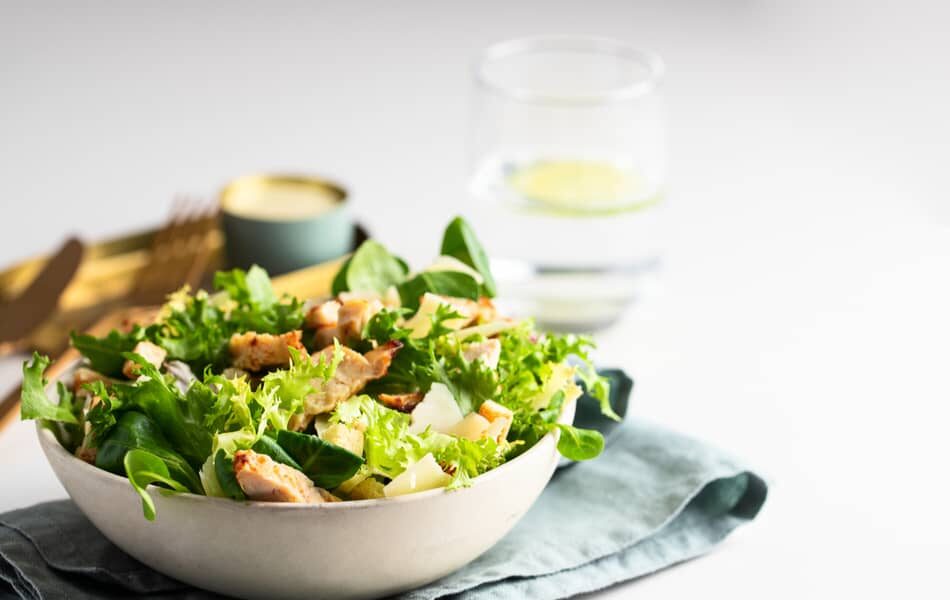Can Lettuce Cause Diarrhea? Understanding the Causes
Lettuce – a vegetable that forms the basis for so many healthy foods, can cause some unpleasant gut issues. Let’s find out why.

Most people view lettuce as the most harmless food in the world as it is rich with nutrients, provides incredible hydration thanks to its high water content, and forms the basis for half of the salad recipes on the planet.
How could it possibly cause something as unpleasant as diarrhea?
Suppose you’ve found yourself asking this question. Then you’ve come to the right place.
Thank you for your answer
Health Reporter Surveys
In this article, we will find out exactly why lettuce causes unexpected bowel movements in some people and what you can do to combat this if you happen to be one of them.
Read on for more.
Can Lettuce Cause Diarrhea?
Lettuce is a low-fiber food that is very unlikely to cause IBS symptoms or diarrhea. This is because it is a low FODMAP vegetable, making it more likely to ease IBS symptoms.
If you’re already eating quite a bit of lettuce but still struggle with symptoms of IBS and diarrhea, we suggest trying a fiber or probiotic supplement that improves body detoxification and alleviates bloating and constipation.
Why does lettuce (salad) give me diarrhea?
If you are struggling with diarrhea when eating salad, it is most probably because lettuce contains fiber, which is a common trigger for people with IBS. Even though lettuce is low in fiber, those sensitive to it may find themselves having difficulties.
Other high-fiber foods in your salad, such as Brussels sprouts or kale, could be loosening your stools and making it uncomfortable to go to the bathroom.
If you find that your favorite health foods are causing you trouble when using the toilet, it might be time to turn to a supplement for digestion, which promotes better gut health.
It helps keep you regular while providing your body with all the fiber it needs to pass stools comfortably.
Does Lettuce Cause Gas?
In most scenarios, lettuce does not cause gas. It can, however, cause abdominal distension – bloating – in some people. While uncomfortable, it typically will not result in gas.
However, some of your favorite salad ingredients might be the cause of your gassy stomach. Here are some of the most common foods that are known to cause intestinal gas:
- Lentils and beans
- Corn, potatoes, and other starch-rich foods
- Broccoli, asparagus, cabbage, and Brussels sprouts
- Lactose, found in dairy
- Whole grains, like oatmeal, brown rice, and whole wheat
If you can reduce the frequency at which you eat these foods, then you can reduce your intestinal gas.
Can Lettuce Upset Your Stomach?
As we’ve already learned, lettuce can upset your stomach. With kale and other greens, lettuce contains several different flavonoids, which have antioxidant and anti-inflammatory effects.
Still, they are also loaded with fiber that can loosen things up in your gut. We already know that too much fiber of this kind can cause unpleasant side effects.
It might not be the lettuce in your salad that’s causing you intestinal distress, but rather the salad dressing you’re using. This is especially true if you’re using a vinaigrette dressing, which is acidic and can trigger heartburn in some people. And, if you struggle with inflammatory bowel disease, this kind of dressing can upset your bowels further.
Why Can’t I Digest Lettuce?
Lettuce is usually relatively easy to digest, but everyone’s digestion process is different. There are tons of factors involved in making food easy to digest for some and challenging for others.
If you notice lettuce in your stool after going to the bathroom, don’t worry – this usually happens with fibrous foods like corn, most beans, and other high-fiber foods.
However, when the digestion of lettuce becomes painful, you might have an underlying medical condition that is causing you discomfort after consuming lettuce.
These conditions could include IBS, food sensitivities, or simply a food allergy, though that last one is quite rare.
Can I Have Lettuce Intolerance?
While it’s pretty rare, it is possible to have a lettuce intolerance. However, rather than an immediate allergy to lettuce, you might instead have a delayed lettuce hypersensitivity, which is, essentially, a reaction caused by your immune system’s reaction to a food. This causes distress and often some pretty severe symptoms, including rash, itchiness, and stomach pains.
When this hypersensitivity occurs, the immune system produces specific antibodies that fight off the allergens found in your food. This causes the release of histamine and other naturally-occurring chemicals, which then cause inflammation and the discomfort you feel after eating lettuce.
Lettuce and IBS
If you have IBS, then worry not. You can eat lettuce without worrying about experiencing IBS symptoms and pains (provided you aren’t combining it with other foods that will trigger your symptoms).
Lettuce is a low-FODMAP food, making it an excellent alternative to high-FODMAP foods.
Foods rich in FODMAPs release gas into your gut more quickly than it can be absorbed into your blood for excretion via the lungs.
So, these foods are thought to cause stomach pains in people with sensitive stomachs.
A Word From Nutritionist
Lettuce is the foundation of so many healthy foods these days, and you might feel cheated out of hundreds of delicious, healthy meals just because your body has a bad reaction to lettuce.
But don’t worry. There are plenty of alternatives you can incorporate into your diet that won’t upset your stomach and provide you with all the health benefits of lettuce.
Spinach, kale, arugula, and Swiss chard are some of my favorite substitutes for lettuce in salads.
Top them off with some low-FODMAP vegetables like bean sprouts, bok choy, carrots, chives, red bell peppers, and cucumber, and you’ll have a delicious salad that will make your gut – and the rest of your body – happy.
Conclusion
Don’t feel like it’s the end of the world just because you can’t eat salad. Dozens of substitutes will provide you with a myriad of health benefits that are just as tasty and nutritious as regular iceberg lettuce.
And if you find that you just can’t get enough fiber through the foods you eat, consider giving one of the many fiber supplements a try – they are designed to improve digestion and help you be more regular in the bathroom.

















































 Select your language:
Select your language: 








